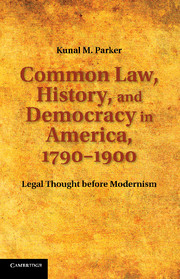3 - Time as Consent
Common Law Thought after the American Revolution
Published online by Cambridge University Press: 03 May 2011
Summary
The Loneliness of Consent
Over the past several decades, scholars have been made aware of many of the intellectual sources of the American revolutionary struggle, the period of constitution making, and its aftermath. These include republican thought, Lockean natural rights, Scottish ideas about the shift from the feudal to the commercial, common law thought, and Protestant millennial thought. These various intellectual sources were often mixed in ways that are difficult to separate out. The writings of Bolingbroke, Kames, Blackstone, and others were fully part of this complex universe of ideas.
It is important to emphasize, however, that none of the British writers discussed in the preceding chapter had mapped out the truly innovative political structure that emerged out of the 1787 Philadelphia convention. While eighteenth-century British legal thinkers had imagined government to be constrained by the logic of history, and had sought to subject law to criticism in the name of the logic of history, few had imagined a government in which all three of the traditional orders of government would be subjected to the electoral principle. Accustomed to monarchy and aristocracy, to a world in which birth determined status, eighteenth-century Europeans deemed the constraint of history just one among many.
- Type
- Chapter
- Information
- Common Law, History, and Democracy in America, 1790–1900Legal Thought before Modernism, pp. 67 - 116Publisher: Cambridge University PressPrint publication year: 2011



